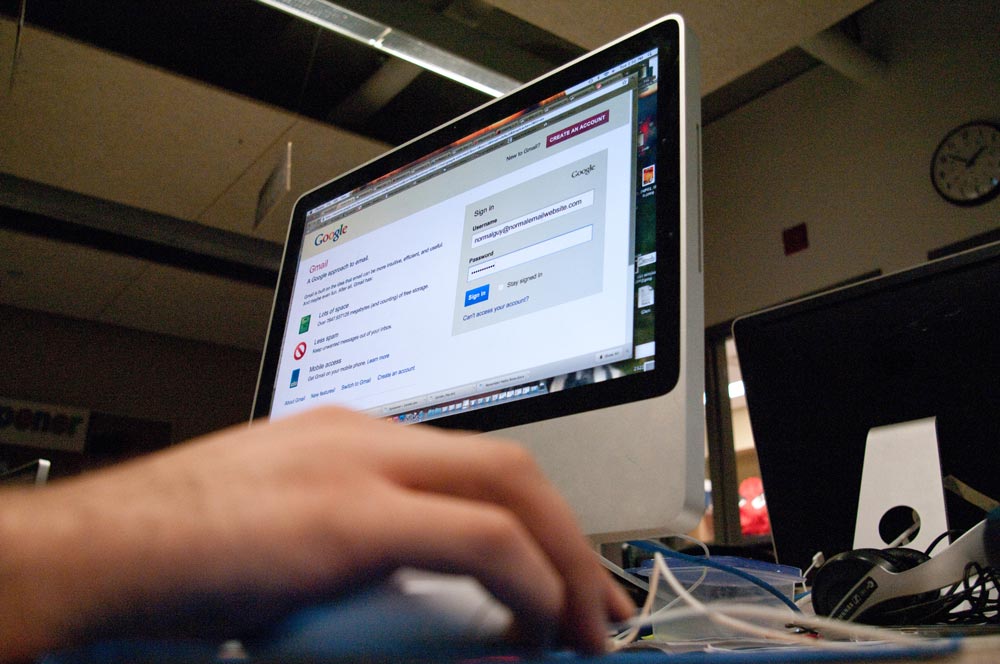After years of worrying about privacy issues associated with the American Patriot Act, Ryerson is finally looking to make the big switch to Google Apps for Education. Associate News Editor Carolyn Turgeon reports
After 10 years of using Rmail, Ryerson is finally taking steps to switch to Gmail despite privacy concerns.
Ryerson Computing and Communications Services (CCS) and their E-mail and Collaboration Committee have drafted a proposal for Ryerson to adopt the Google Apps for Education online suite.
If the draft is approved by the town hall, the final proposal will be brought to the executive.
“When there’s a final recommendation we’re going to look really hard at it and make a decision,” said Julia Hanigsberg, vice president administration and finance.
They are hoping to receive the recommendation by the end of December and, if approved, students, staff and faculty will have the option to use Google instead of the current university-wide e-mail, calendar and collaboration platform.
On Nov. 14, the committee held its first town hall session to allow the community to respond to the proposal.
“The town halls are part of saying ‘here it is’ and allowing people to comment and ask questions,” said Brian Lesser, director of CCS.
“I’m thrilled with the way the team has gone about this,” said Hanigsberg of the considered feedback from the entire community.
The next session is Nov. 25 at 9 a.m. and, if the response is still positive, the proposal will move on to Hanigsberg and the executive.
“If they agree and everyone’s on board we’ll start negotiating with Google,” said Lesser.
He predicts that if everything goes forward smoothly the new system could be in place as early as Fall 2012.
The platform is free for accredited post-secondary institutions and allows them to retain their own custom domains. Ryerson has considered switching for nearly two years but the major concern up until now was a discretion in privacy on American servers.
The American Patriot Act allows confidential information held in servers to be available to the American government at any time without notification.
In contradiction, Canada’s Freedom of Information and Protection Privacy Act requires that universities secure student records, including academic standing, grades and contact information, and keep them private.
“I would stay with my Rmail, because I don’t feel comfortable with my information being available to the U.S. government,” said Stephen Fenn, a first-year social work student.
The committee worked with Ryerson’s Privacy Coordinator and consulted with staff from the Office of the Information and Privacy Commissioner of Ontario to develop a Privacy Impact Assessment.
Ryerson President Sheldon Levy was confident in the minimal amount of risk.
“The privacy commissioner of Ontario, who I have a huge amount of confidence in, has absolutely convinced me that it is not an issue,” said Levy.
Canada has its own terrorism laws that allow searches without a warrant, similar to the American Patriot Act. They also often share information and searches with the United States and ask for warrants from each other’s country.
“There’s a long history of lawful access,” said Lesser. “The actual risk of being in another jurisdiction is not as great because they’ve always had that ability.”
In comparison to Rmail, which can be accessed by the Canadian government, Gmail is actually safer, according to Lesser.
“Google data centres are like little armed camps,” he said.
Concerned students will be able to opt out of the potential email change.
“For most people Gmail is fine but for people who are concerned we’ll continue to operate Rmail,” said Lesser.
This means that the university would not be able to fully shut down the current system, and will therefore still be paying for it, although the use of Google applications will eliminate the need for GroupWise, the current collaboration system.
“We will be able to provide, for a similar cost, a much more robust set of tools,” said Hanigsberg. “This project has never been about cost savings.”
“We’re not actually going to save money of any significance,” said Lesser, adding that there may still be costs for implementation.
The choice to pursue a Google implementation came from a Request for Proposal (RFP) that considered accessibility, security, privacy, ownership of data, mail opt out options, legal jurisdictions and the Patriot Act.
Lesser said they were also aware that some students already forward their Rmail accounts to Gmail accounts, allowing them to view it all together and exposing themselves to the Patriot Act.
“[The forwarding] just tells you something: that your e-mail system sucks,” said Lesser.
He makes it clear that the new system will give students, staff and faculty more than email. They will also have use of Google Calendar to book office hours with professors. Student groups will be able to use Google Documents to work together and Google Plus will also allow members to communicate and video chat.
“That’s where Ryerson wins economically because we could not do [these things] without spending tens of millions [of dollars] in-house,” said Lesser.












Brian Lesser
HI Carolyn,
Thanks for writing about this! There’s more information about what we are proposing, privacy, and the consultation process here:
http://email.blog.ryerson.ca
Thanks again,
-Brian
Behram
Thoes who are worried about privacy must be hiding something.
I have used Gmail for almost half of my life, it’s never been hacked/comprimised like Hotmail accounts or Yahoo accounts do.
Gmail’s GUI (graphic user interface) is a lot user friendly then Rmail, Gmail has feature that Rmail can’t even dream of. And most importantly, with Gmail searching for a specific file/email/whatever is super easy. Also with Google Calender you can get notifications about anything (from assignemtn deadlines to appointments) right to your cellphone, whether its an Andriod, iPhone, or any other type of phone.
I hope Ryerson makes the jump to Gmail. It would make all of our lives easier.